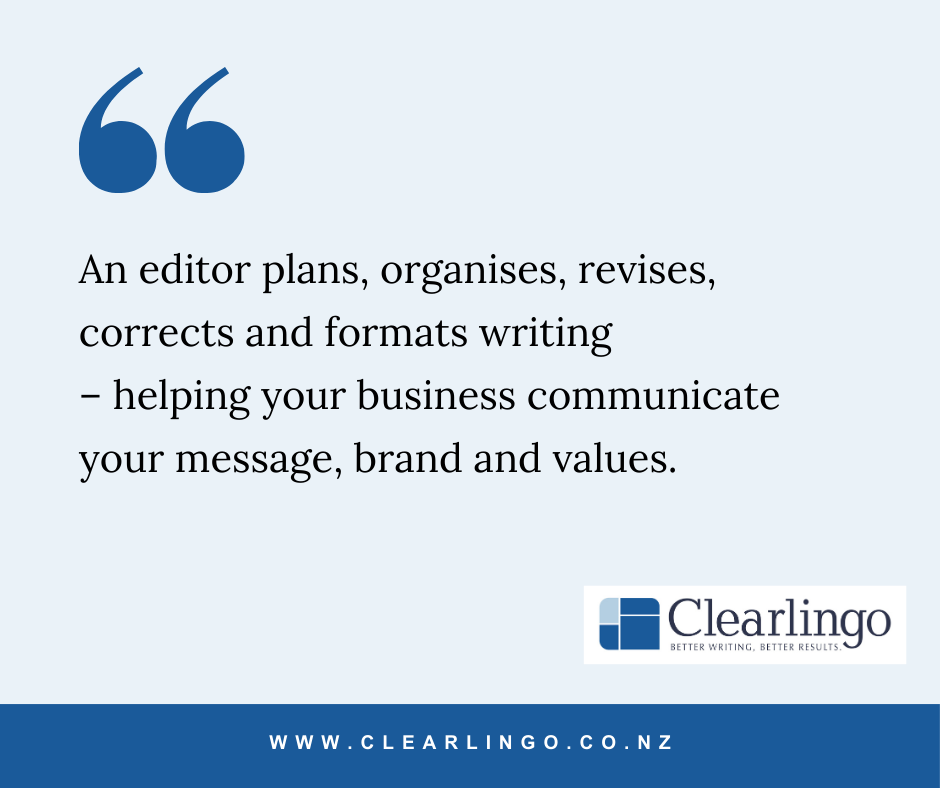|
Communicating your message, your brand and your values accurately and effectively are vital to your business. Whether you write a business blog, a report, marketing material, emails, social media posts or an e-book, you want to communicate clearly and accurately. If you write content, and want to look professional and engage with your readers, working with an experienced editor can be beneficial to your business. And in a world of outsourcing and working from home, it’s easy to work with a qualified, experienced editor without having to hire someone full-time, whether it’s for a one-off project or as a long-term relationship. So, how can working with an editor help your business? 1. You have an experienced second pair of eyes
It’s very difficult to edit your own work, especially if you’ve just written it. You just can’t see the typo or the odd-sounding sentence – your brain sees what you think you wrote, not what you actually wrote. When you’ve been looking at your writing for too long and you no longer see what’s there, editors provide a fresh, experienced perspective. While there is software that can help check spelling and grammar, AI will never replace an editor’s human touch. An editor will use their experience and intuition to help you choose between words with slightly different nuances, and they’ll know things that the the software won't, such as when and how to use a New Zealand English or te reo Māori word, or when to break that grammar rule so that it suits your voice. 2. Your content will be stronger Many people are good at grammar and spelling, but there is more to editing than that (though we do that too). Editors know what to look for, what to change and, just as importantly, what to leave. An editor will work closely with you to make sure that your readers – those are your clients and potential clients – get the message that you intended. To do this they
2. You’ll appear more credible and trustworthy to your readers The occasional typo is OK (everyone does it) but if you consistently publish content with typos and grammar mistakes, this will not give people confidence in your business. A client won’t choose your business if they think you don’t care about the details. Show you care about your products and services, and about the reader, by making sure your content is clear and accurate. And mistakes don’t just include typos and grammar mistakes. Broken links, unclear or incorrect information, and not backing up your claims can also damage your credibility – and these are all things that editors look out for. Working with an editor will make sure you’re putting your best foot forward. 3. You’ll be less likely to cause offence, or get into legal problems Words matter. The right words can show that you are an expert, but the wrong ones can offend and give a negative impression of your business. Language changes happen quickly, especially today with social media, but editors love words and consciously strive keep up with the changes. An editor will be on your side to make sure your words don’t (inadvertently) harm your business or reputation. Editors also know how to deal with copyright and trademarks, such as attributing quotes, asking permission to use material, and crediting images. And while editors aren’t legal experts, they will flag instances with the potential for defamation. 4. You’ll make more money Yes, really. Sometimes you have to spend some money to make money. Most businesses think nothing of hiring a marketing expert or website developer to make sure their marketing works and their website SEO is up to scratch to attract more clients. In the same way, an editor can help your business attract more clients. People choose a particular product or service over one from another business because they trust the business, they feel like they can relate to the business, and they feel respected by the business. Trust is built when a client knows exactly what a business does and how, and when the business' values are aligned to theirs. An editor will know your brand and values and adjust your content to speak directly to the client in language that they understand. The client will feel comfortable with your business and be more likely to engage your services or buy your product. And you’ll also save money. Content that is clear and easily understood improves efficiency and reduces mistakes and misunderstandings, saving time and frustration to fix and clarify information. Editors are efficient in their work, saving your own employees time and allowing them to concentrate on other tasks. How can you afford not to work with an editor? How do you work with an editor? Are you a little worried about handing over your writing to someone else, especially someone outside your business? Read my blog post on how to work with an editor Get a free quote for my business editing services Got an unruly report that needs to be whipped into shape, or some untidy copy that needs some TLC? Get in touch today to enquire about my business editing and plain language services. For more information on how I can help you make your writing shine, please contact me. I would love to hear from you. Comments are closed.
|
Hi, I'm Marja!You'll find all my advice about creating professional, Categories
All
Previous PostsPlain language
Business editing New Zealand English series The editing process General editing Technical |

